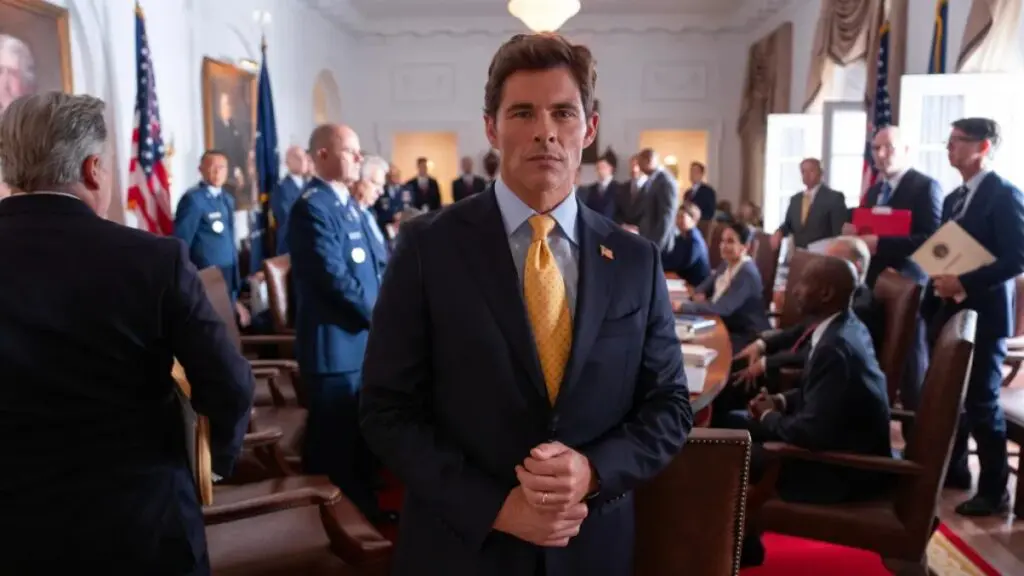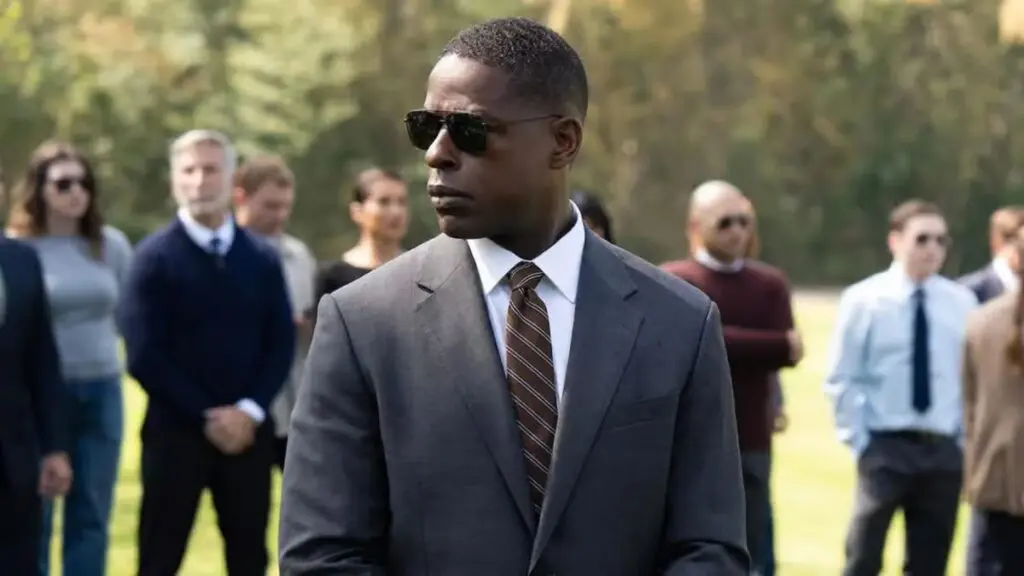Summary
Paradise tops itself once again in Episode 7, delivering a blisteringly tense and expertly constructed hour of television that might end up being the year’s best.
This is a big statement, but Season 1, Episode 7 of Paradise is probably going to end up being the best hour of television of 2025. It’s hard to imagine how anything could top it. Few shows have an episode like “The Day” in their locker; a masterfully constructed exercise in escalating tension that has a strong core of human emotion, outstanding performances, and the most detestable villain in recent memory. Sterling K. Brown (Hotel Artemis; Waves) and James Marsden (Dead to Me) deserve Emmys, whoever came up with Sinatra needs a sternly worded email, and however Hulu’s hit decides to end in the next episode, that already-confirmed Season 2 needs to arrive ASAP.
I’m going to go over it all, but this isn’t an episode about details; it’s all vibes. It’s almost exclusively set during the final day of the old world, a day marked by a series of calamitous incidents and tragedies, some natural and some man-made, all toppling in sequence like a snake of dominos. Everything that happens is bad. Each new development is worse, and more devastating than the previous, and so many of them are avoidable that the overall effect is like being cinematically waterboarded for sixty minutes. I mean that as a compliment.
But first, context.
The Man Who Saved the World
Episode 7 has a cold open set on October 27, 1962, at the very peak of the Cuban Missile Crisis, where an American general tells his wife a now well-known story about how the world was saved.
In short, Soviet naval officer Vasili Arkhipov, as the second captain and brigade chief of staff on a B-59 nuclear submarine, was under instructions to launch a nuclear torpedo if America got the upper hand in the stand-off. Surrounded by U.S. destroyers and depth charges, thoroughly beaten, he disobeyed those orders and refused to fire. It’s perhaps just as well since the resultant exchange between the world’s preeminent nuclear superpowers would have likely ended life as we know it.
It isn’t immediately clear why all this matters to Paradise, but trust me, it does. We’ll return to this later.
The Beginning of the End
Picking up where we left off, Sinatra reiterates to Xavier that Teri is still alive. Briefly, she explains about having the expedition team killed when they tried to bring a survivor back to the bunker. But she also claims the team was able to set up shortwave transmitters that are still active — and that she’s still listening to. Survivors are transmitting distress messages constantly. They’re out there.
Xavier isn’t convinced, since Teri was in Atlanta, which was hit directly by a nuclear weapon. Or so he thinks. Sinatra tells him that Cal did something on that day that he didn’t know about, and that thing might be the key. It’s also what gives the cold open its striking significance. But, again, we’ll get to it later. There’s plenty to go over in the meantime.
It begins with the eruption of a supervolcano under the Antarctic ice shelf, which triggers a ruinous tsunami. The scientific modeling around the event theorized several days between the first seismic activity and the eventual eruption, but the prediction was way off. The volcano erupted in mere minutes, blindsiding and devastating the world. Multiple coastal countries are wiped out wholesale. The remaining superpowers, particularly Russia and China, plan to seize the opportunity for a land grab. Chaos ensues.
Crisis Management
Cal knew this was coming. It’s why the Versailles Protocol exists. But he had no idea of the speed and severity with which it would happen, or how everyone else would respond to it. And now he’s stuck in a position where he has to be evacuated to Paradise while deceiving the American people, including his staff. While all this is going on, Xavier is trying to get in touch with Teri, who’s stranded in Atlanta.
Every step of this process is riveting. Cal is disgusted by the idea of recording a message to the nation that will play after his evacuation, disguised as a reassuring live broadcast, but he’s being strongarmed into doing it. Xavier is trying to keep that under control, as well as keeping a rookie agent calm amid the chaos, all while desperately trying to contact Teri. Every positive step forward is met with a couple back. Russia and China prepare to exchange nukes, Denmark gets struck by missiles of unknown origin, and the timetable is sped up again; Xavier finds out where Teri is, where she needs to go, and how long she has to get there, but can’t get in touch with her for long enough to give her clear instructions on how to go about it.

James Marsden in Paradise | Image via Hulu
And yet within all this Paradise Season 1, Episode 7 finds small moments of extraordinary warmth and humanity. One involves Jeffrey, a cleaner in the White House for the past nine administrations who Cal keeps seeing floating around in the background of shots, going about his business. When Cal eventually approaches him, Jeffrey shrugs off the concern. He has seen it all before. He was in the White House during 9/11, wars in the Middle East, pandemics, and multiple other crises. He’ll see his family tomorrow. A tearful Cal can’t bring himself to tell him that he won’t; that his family won’t be alive tomorrow.
Spurred on by this, Cal decides to tell the world the truth. He gives a live broadcast expressing the true seriousness of the situation, which causes uproar even in the White House. Xavier knows what’s coming. But even while donning body armor and loading automatic weapons, he’s trying to call Teri. When the White House staff realize they’re being abandoned and the Secret Service turns their guns on the functionaries, he’s trying to call Teri. As he hustles Cal and the nuclear football across the lawn amid a riot, after Robinson shoots the rookie agent in the head for the crime of trying to get on the helicopter that is spiriting the president away, all Xavier is thinking about is Teri.
This comes to a head in a tremendous scene between Xavier and Cal which is awards-worthy in isolation but emotionally crippling in the context of the show overall. It finally dawns on Xavier that Teri isn’t going to make it and that Cal knew she wouldn’t. He blames Cal for that, even though everything he has seen has reiterated that Cal is simply a cog in a machine whirring without his consent. He believed the scientists’ timeline. He meant it when he said he’d get her a plane to safety — he even tried to in this very episode. Circumstances made a liar of him.
The Man Who Saved the World Pt. II
Xavier gets on the plane to join Presley and James. He has no other choice. He’s now literally a passenger, which is all he has been throughout the process. The real power rests in Cal’s hands, and how he decides to exert it is the defining moment of Paradise Episode 7.
While aboard Air Force One, the Joint Chiefs call in with a recommendation. The world is on the cusp of an all-out nuclear war. The carnage will be indiscriminate. The only way to avert it is to fire first. They tell Cal to unload America’s entire nuclear arsenal at every nuclear-equipped nation, just in case they get the same idea. And the only way to do that is via the nuclear football.
Everyone knows about the nuclear football; it has featured in so many thrillers by this point that it’s essentially common knowledge. Everyone knows that the commander-in-chief has access to a big, fat briefcase that allows him — or her — to unilaterally launch Uncle Sam’s entire nuclear arsenal. I don’t know if this bit is true, but in Paradise, the football has a red book containing all the launch codes. But it also has a blue book, containing different codes. Cal explains to Sinatra, who is pushing him to launch the nukes, that the blue book was an idea posited by a general during the Cuban Missile Crisis. It’s the ultimate failsafe — an array of linked EMPs designed to fry every electronic circuit on Earth. The downside is that it’ll shut the world off and take the planet back 500 years. The upside is that it’ll disarm the nukes and give humanity a fighting chance of survival.
Cal inputs the blue codes. At the same time, Xavier has finally managed to get through to Teri using a satellite phone. On screens, he and Cal can see the trajectory of the nuclear warheads, including one heading directly for Atlanta. On Cal’s screen, he can also see the creeping progress of the EMPs, as things start to shut down. It’s a race. Teri’s survival hinges on the nuke being disabled before it lands. Xavier never knew what Cal did, so he assumed that the satellite phone going dead meant Teri was gone.
Back in the present day, Sinatra reveals to him the truth. The EMP got there first. Teri survived. And to prove it, she plays one of the shortwave transmissions, a message from her saying she’s looking for her husband and children. But then she drops another bombshell — she has Presley. The only chance Xavier has of seeing his wife and daughter again is to put Paradise back the way it was. If he does that, Sinatra will also identify who murdered Cal. The DNA from the crime scene doesn’t match anyone from the bunker. His murderer came from outside.
RELATED:




